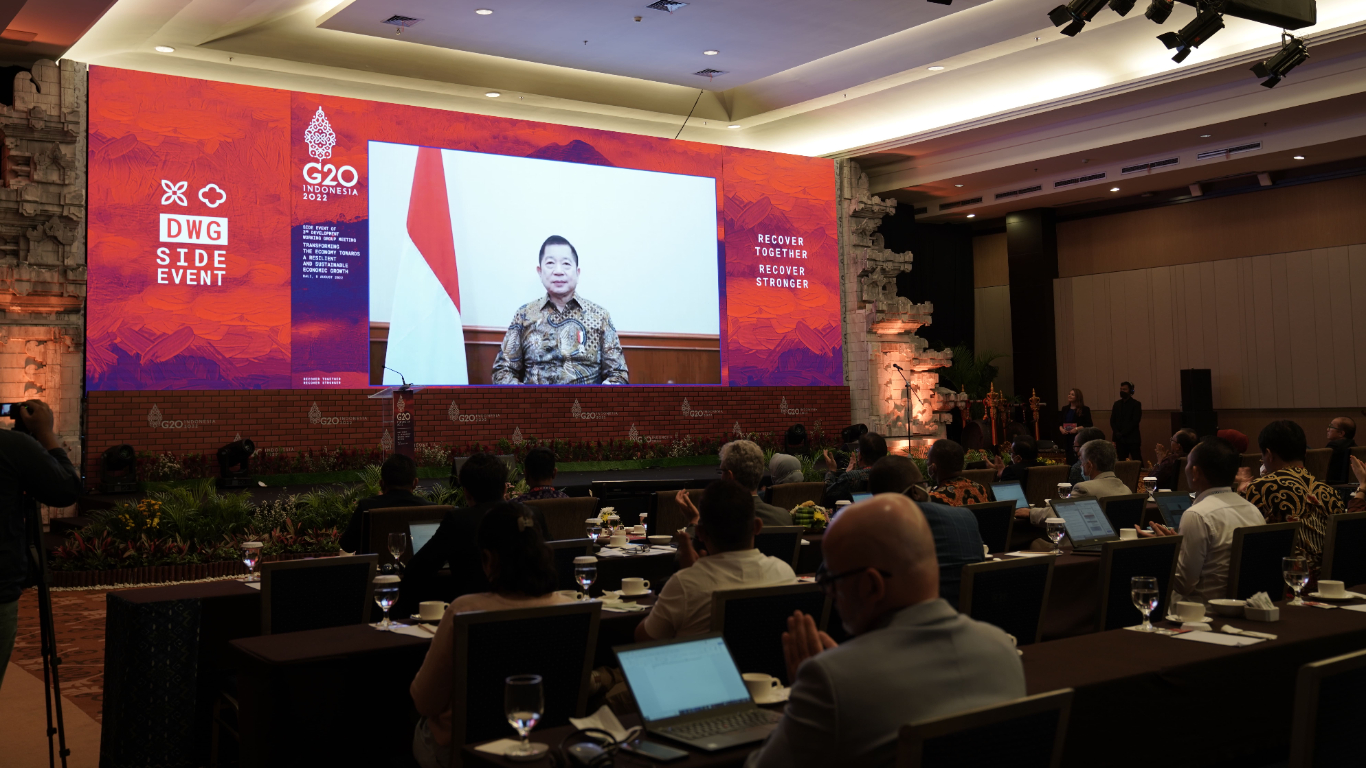Bappenas Underlines Indonesia’s Economic Transformation Strategies During 3rd DWG Meeting Side Event
Prime News - Tue, 09 August 2022

The Minister of National Development Planning/Head of Bappenas Suharso Monoarfa emphasized the importance of implementing the six main strategies for Indonesia’s economic transformation plans at the “Transforming the Economy Towards a Resilient and Sustainable Economic Growth” side event at the 3rd G20 Development Working Group (DWG) Meeting in Bali.
The six strategies include increasing human resource competitiveness, improving economic productivity, developing a green economy, accelerating digital transformation, strengthening economic integration, as well as developing the new National Capital City (IKN). Minister Suharso underlined that these strategies will have an impact on Indonesia’s economic growth in the future, in terms of sustainability and inclusivity.
“These strategies are expected to make our economy, and the global economy as well, more resilient and stronger. Indonesia’s economic transformation agenda is based on the goals of the Indonesia 2045 Vision,” Minister Suharso said on Monday (8/8).
During implementation, the strategies will then be elaborated and adapted to economic requirements both at the national and regional levels. “Strategies at the regional level are needed because economic problems and requirements are different in every region, making it not possible to have a ‘one for all’ policy for every region,” Minister Suharso said.
One of the examples of a strategy with specific regional requirements is the “Kerthi Bali Economic Roadmap Towards a New Era in Bali: Green, Resilient, and Prosperous” roadmap designed by the Ministry of National Development Planning/Bappenas. As a barometer of the Indonesian economy, it is imperative that Bali carries out the strategies laid out in the roadmap as it recovers from the economic decline experienced as a result of the Covid-19 pandemic, which it is currently doing.
In addition to discussing Indonesia’s economic transformation strategies, the “Transforming the Economy Towards a Resilient and Sustainable Economic Growth” side event also takes into perspective the views of several development planning figures, such as the former Ministers of National Development Planning/Head of Bappenas Bambang Brodjonegoro and Armida Alisjahbana, as well as the input of the Director of the Growth Lab Center for International Development at Harvard University’s Kennedy School of Government Ricardo Hausmann, who also served as Veneuela’s Minister of Planning between 1992 and 1993.
Through the side event, Indonesia aimed to discuss how to turn the Covid-19 pandemic and its effects into a positive learning moment that helps determine the collaborative steps towards economic transformation by discussing sub-national issues as examples of improved rebuilding efforts. Indonesia hopes that the discussions will help contribute to increasing
collective capacities and partnerships among the G20 countries, which can result in further economic transformation and greater economic resilience.
About the Development Working Group
The Development Working Group (DWG) is one of the working groups of the 2022 G20 Indonesia Presidency which aims to discuss development issues in developing countries, least developed countries (LDC) and island countries (Small Island Developing States/SIDS). The DWG was first formed at the 2010 G20 Summit in Toronto, Canada with the main task of discussing the G20 priority agendas in the field of development. The DWG identifies development challenges, and then formulates the best solutions to promote economic growth in developing and low-income countries as an effort to mitigate the global financial crisis.
During the Indonesian Presidency of the G20 in 2022, the DWG raised four priority issues, namely:
1) Strengthening Recovery from the Covid-19 Pandemic and Ensuring Resilience in Developing Countries, Underdeveloped Countries, and Archipelagic Countries through the three key pillars of MSMEs, Adaptive Social Protection, and Low-Carbon Green and Blue Economies
2) Increasing Private and Blended Financing in Funding Sustainable Development in Developing Countries, Underdeveloped Countries, and Archipelagic Countries
3) Renewing the Global Commitment to Multilateralism for Sustainable Development
4) Coordinating the progress of achieving the SDGs in the G20 and updating the G20 Development Commitments.
The DWG’s focal points, organized by the Ministry of National Development Planning/Bappenas, are the 1st DWG Meeting in Jakarta (24-25 February) and the 2nd DWG Meeting in Yogyakarta (24-25 May). A third DWG meeting will be held in Bali between 10 August to 12 August 2022. The G20 Indonesia Presidency will also hold the G20 Development Ministerial Meeting in Belitung on 7-9 September 2022.
